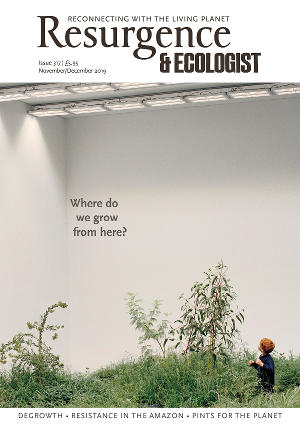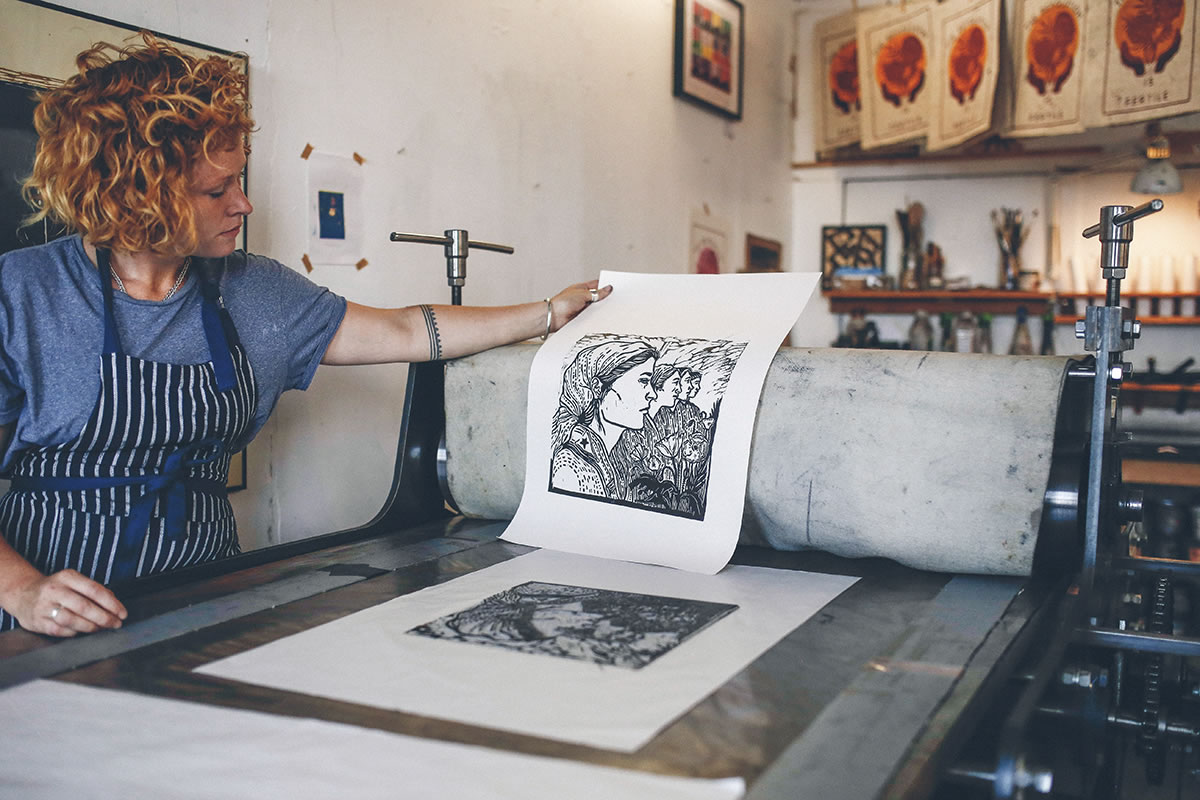When artist Rosanna Morris set up a new community printmaking studio in Easton, Bristol two years ago, she faced a dilemma. To create the huge woodcut prints she loves, prints so big they demand attention, she needed an enormous printing press. This would normally mean, for her and her two co-founders, an enormously expensive machine beyond their savings. What could they do? The solution came from her partner, Konstantinos, who designed and made one from scratch, in part from an old factory wheel.
Now standing in the centre of their Cato Press studio is an elephant of a press, two metres long, affectionately named Bouboulina after a female, naval hero from Konstantinos’s native Greece. The real Bouboulina was an “amazing woman” from the 1800s, Morris told me: “She has this huge unibrow, these big boobs, she’s really powerful. She was a 40-year-old single mother fighting for Greek independence.”
Bouboulina the press is the beating heart of the community print nights Morris runs, which attract people from all cultures and professions, from skilled printmakers to those who have never carved. On these nights, everyone works on the same huge woodblock, all their hands making countless tiny cuts that together make up the whole image. “There is a metaphor in that,” she says. “Everything I’m doing is about bringing community together.”
Morris, now 29, was brought up on a rough Bristol estate by a single mum who would drag her out for long walks in Nature every Sunday. Her mum encouraged her drawing, and after studying illustration at Camberwell College of Arts in London, Morris moved back to Bristol and started a family.
She worked with watercolours for a time before she “fell in love with the strength and confidence of the line in woodcut”. Carving woodcut is like meditation, she says, but also real physical work and incredibly satisfying for the beautiful, bold image at the end. Her intricate black-and-white prints feature traditional themes: farmers planting seeds, milking cows or pulling up lettuces. The tradition is paired with an unmistakable rough and radical edge. They are intended to be raw, she says, and “speak to that part of ourselves”.
Art and activism go hand in hand in Morris’s prints. Last year she designed a calendar to spread the word about the Landworkers’ Alliance, a grassroots union of farmers and growers with a fresh take on organic arming. She also provided animations for their documentary film, In Our Hands, and is now working on a new calendar. It’s a cause close to her heart. When she’s not in her studio or caring for her two young children, she’s at her allotment growing vegetables for the family and spreading the organic message one conversation at a time.
Recently Morris has been inspired to add splashes of pink, yellow and blue to her black-and-white prints. This burst of colour reflects the wave of energy and inspiration she feels from the climate activism of Extinction Rebellion and Greta Thunberg. At last it feels as if things are changing for the better. One of these new colourful prints shows a pair of hands cradling huge flower heads backed by the sun and the words “The Revolution is Fertile”.
Even though she lives in the city, Morris sees her future as close to the land, growing her own food. Through her art – cutting the wood by hand, the ink, the press – she breathes life into that vision whether she’s working alone or with other hands making large, bold prints on Bouboulina celebrating Nature and a radical shift in our politics.
Art can seem like a nice-to-have, she says, but it is vital for telling a story and bringing people together, inspiring them and motivating change. As she puts it, “I make pictures of what I want to see.”
For more information visit: www.rosannamorris.com








